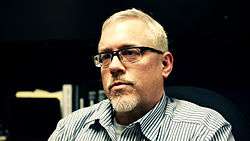James Hughes (sociologist)
| James J. Hughes | |
|---|---|
 In San Francisco 2012 | |
| Born |
May 27, 1961 Columbus, Ohio |
| Residence | Hartford, Connecticut, US |
| Nationality | American |
| Education | Ph.D., M.A. (Univ. of Chicago), B.A. (Oberlin College) |
| Occupation | Executive Director of the Institute for Ethics and Emerging Technologies Institute for Ethics and Emerging Technologies,[1] |
| Known for | Work in Sociology, Executive Director at Institute for Ethics and Emerging Technologies (IEET), Director of Institutional Research & Planning at Trinity College |
| Notable work | Wrote Citizen Cyborg |
| Spouse(s) | Monica Bock |
| Website | http://ieet.org |
James J. Hughes (born May 27, 1961) is an American sociologist and bioethicist. He is the Executive Director of the Institute for Ethics and Emerging Technologies[2] and teaches health policy at Trinity College in Hartford, Connecticut in the United States.[3][4] He is the author of Citizen Cyborg: Why Democratic Societies Must Respond to the Redesigned Human of the Future[5] and is currently writing a book about moral bioenhancement tentatively titled Cyborg Buddha: Using Neurotechnology to Become Better People.[6]
Biography
Hughes holds a doctorate in sociology from the University of Chicago, where he served as the assistant director of research for the MacLean Center for Clinical Medical Ethics.[4] Before graduate school he was temporarily ordained as a Buddhist monk in 1984 while working as a volunteer in Sri Lanka for the development organization Sarvodaya from 1983 to 1985.
Hughes served as the executive director of the World Transhumanist Association (which has since changed its name to Humanity+) from 2004 to 2006, and currently serves as the executive director of the Institute for Ethics and Emerging Technologies, which he founded with Nick Bostrom. He also produces the syndicated weekly public affairs radio talk show program Changesurfer Radio and contributed to the Cyborg Democracy blog.[7][8] Hughes' book Citizen Cyborg: Why Democratic Societies Must Respond to the Redesigned Human of the Future was published by Westview Press in November 2004.[5]
Rejecting bioconservatism and libertarian transhumanism, Hughes argues for a third way, "democratic transhumanism", a radical form of techno-progressivism[9] which asserts that the best possible "posthuman future" is achievable only by ensuring that human enhancement technologies[10] are safe, made available to everyone, and respect the right of individuals to control their own bodies.[11]
Hughes is also on the "Academic Advisory Council" of the Christian Transhumanist Association [12]
James Hughes is also an international conference speaker on transhumanist topics. In April 25, 2016, Zoltan Istvan had a transhumanism politics debate with James Hughes at Harvard University. According to a report on Vice motherboard, "For the first time, Hughes and Istvan met on the debate stage, in a small classroom auditorium at the Harvard Kennedy School in Cambridge, Massachusetts It wasn’t exactly a clash of ideas so much as a clang. It’s clear that Transhumanists on either side of the political spectrum share a basic tenet of the philosophy, the vague notion of the need to use science and technology to make humanity better, but from there on out, everything else is up for debate."[13] James Hughes spoke on Technoprogressivism at Nigeria ICT Fest 2015 in Lagos, Nigeria, via Skype.[14]
Works
- "Embracing Change with All Four Arms: A Post-Humanist Defense of Genetic Engineering". Eubios Journal of Asian and International Bioethics 6(4), 94-101
- Hughes, James (2002). "Politics of Transhumanism". 2001 Annual Meeting of the Society for Social Studies of Science
- Hughes, James (2002). "Democratic Transhumanism 2.0". Transhumanity blog
- Hughes, James (2002–2004). Changesurfing Archived Betterhumans column
- Hughes, James (2004). Book: Citizen Cyborg: Why Democratic Societies Must Respond to the Redesigned Human of the Future. Westview Press. ISBN 0-8133-4198-1
- A collection of interviews and presentations at Science, Technology & the Future.[15]
- Up and coming book: Cyborg Buddha: Using Neurotechnology to Become Better People.[6]
See also
References
- ↑ SRF Home | Institute for Ethics and Emerging Technologies. Ieet.org. Retrieved on 28 November 2014.
- ↑ "James Hughes". ieet.org. Retrieved 2016-07-08.
- ↑ Ford, Alyssa (May–June 2005). "Humanity: The Remix". Utne Magazine. Archived from the original on 2006-03-13. Retrieved 2007-03-03.
- 1 2 Sirius, R. U. (2005). "NeoFiles, Vol. 1, No. 9: Transhumanism's Left Hand Man". Archived from the original on October 15, 2004. Retrieved 2006-08-11.
- 1 2 Hughes, James (2004). Citizen Cyborg: Why Democratic Societies Must Respond to the Redesigned Human of the Future. Westview Press. ISBN 0-8133-4198-1.
- 1 2 "IEET Cyborg Buddha Project". ieet.org. Retrieved 2016-07-08.
- ↑ "Changesurfer Radio with Dr. J".
- ↑ "Cyborg Democracy".
- ↑ "Overview of Biopolitics". ieet.org. Retrieved 2016-07-08.
- ↑ "Cyborg Buddha: James Hughes on Transhuman Enlightenment". Future Thinkers Podcast. 2016-04-14. Retrieved 2016-05-13.
- ↑ Hughes, James (2002). "Democratic Transhumanism 2.0". Retrieved 2006-08-11.
- ↑ "Academic Advisory Council". www.christiantranshumanism.org. Retrieved 2017-06-03.
- ↑ Alex Pearlman (2016): The Opposing Leaders of the Transhumanist Movement Got Salty in a Debate, http://motherboard.vice.com/read/transhumanist-debate. Retrieved April 28, 2016.
- ↑ Agbolade Omowole (2015): Report on Nigeria ICT Festival 2015, http://ieet.org/index.php/IEET/more/omowole20150119. Retrieved January 29, 2016.
- ↑ "Media series with James Hughes | Science, Technology & the Future". www.scifuture.org. Retrieved 2016-07-08.
External links
| Wikimedia Commons has media related to James Hughes. |
- Changesurfer Consulting, a web portal to James Hughes' projects
- Changesurfer Radio, "a weekly, syndicated public affairs radio show transmitting a sexy, high-tech vision of a radically democratic future"
- Institute of Ethics and Emerging Technologies: James Hughes